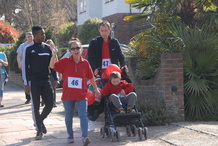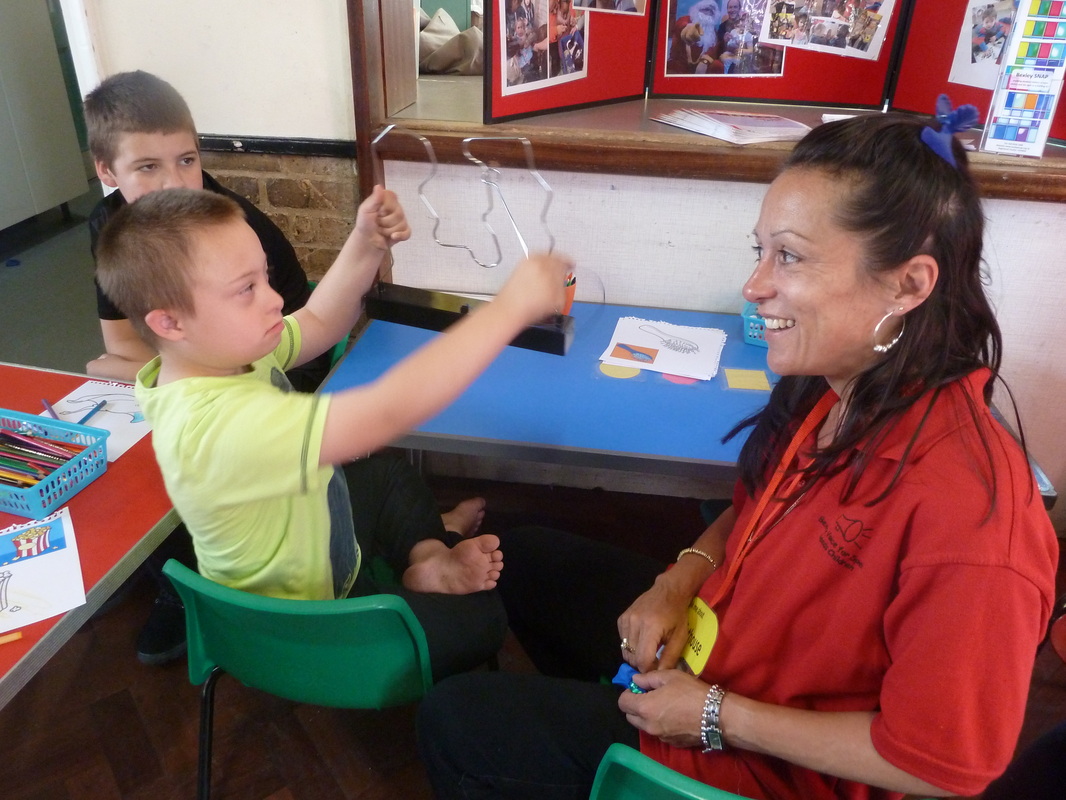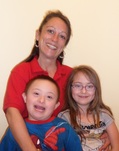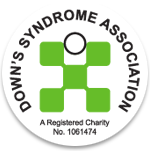Down's syndrome, also known as Down syndrome, is a genetic condition that typically causes some level of learning disability and a characteristic range of physical features.
Most babies born with Down's syndrome are diagnosed with the condition after birth and are likely to have:
Read more about the characteristics of Down's syndrome.
Screening for Down's Syndrome.
In some cases, babies with the condition are identified before birth as a result of antenatal screening for Down's syndrome. If screening indicates there is a chance your baby has Down's syndrome, further testing is available to determine how likely it is. Screening tests don't tell you for definite if your baby has Down's syndrome, but they can tell you how likely it is. The only way to get a definite diagnosis is for a chromosome test to be done using a sample of the baby's blood.
Read more information about how Down's syndrome is diagnosed.
Who is affected?
Down's syndrome is one of the most common genetic causes of learning disability. Around 750 babies are born with the condition each year in the UK. Down's syndrome affects people of all races, religions and economic backgrounds equally. The condition is caused by the presence of an extra copy of chromosome 21 in a baby's cells. It occurs by chance at conception and is irreversible. As yet, no one knows what causes the presence of the extra chromosome 21.
Although the chance of having a baby with Down's syndrome increases with age, babies with the syndrome are born to mothers of all ages. There is no evidence that anything done before or during pregnancy causes the syndrome.
Read more about the causes of Down's syndrome.
Living with Down's syndrome
Some families find it difficult to accept a diagnosis of Down's syndrome and it is not uncommon for parents to experience negative thoughts after the birth of their new baby.
As with most new parents, a relationship begins to develop as their baby becomes more responsive and engaging. It is important to remember that a baby with Down's syndrome has the same needs as any baby. Books, magazines and support from family and friends are just as relevant.
Read more information for new parents on the Down's Syndrome Association's website.
Although there is no "cure" for Down's syndrome, there are ways to help children with the condition develop into healthy and fulfilled individuals who are able to achieve a level of independence right for them. This includes:
Complications
Many children with Down's syndrome have associated health conditions. Possible complications include:
Your child may be checked by a paediatrician more often than other children to pick up developing problems as early as possible. If you have any concerns about your child's health, discuss them with your GP, health visitor or paediatrician.
Most babies born with Down's syndrome are diagnosed with the condition after birth and are likely to have:
- reduced muscle tone leading to floppiness (hypotonia)
- eyes that slant upwards and outwards
- their palm may have only one crease across it (palmar crease)
- a below average weight and length at birth
Read more about the characteristics of Down's syndrome.
Screening for Down's Syndrome.
In some cases, babies with the condition are identified before birth as a result of antenatal screening for Down's syndrome. If screening indicates there is a chance your baby has Down's syndrome, further testing is available to determine how likely it is. Screening tests don't tell you for definite if your baby has Down's syndrome, but they can tell you how likely it is. The only way to get a definite diagnosis is for a chromosome test to be done using a sample of the baby's blood.
Read more information about how Down's syndrome is diagnosed.
Who is affected?
Down's syndrome is one of the most common genetic causes of learning disability. Around 750 babies are born with the condition each year in the UK. Down's syndrome affects people of all races, religions and economic backgrounds equally. The condition is caused by the presence of an extra copy of chromosome 21 in a baby's cells. It occurs by chance at conception and is irreversible. As yet, no one knows what causes the presence of the extra chromosome 21.
Although the chance of having a baby with Down's syndrome increases with age, babies with the syndrome are born to mothers of all ages. There is no evidence that anything done before or during pregnancy causes the syndrome.
Read more about the causes of Down's syndrome.
Living with Down's syndrome
Some families find it difficult to accept a diagnosis of Down's syndrome and it is not uncommon for parents to experience negative thoughts after the birth of their new baby.
As with most new parents, a relationship begins to develop as their baby becomes more responsive and engaging. It is important to remember that a baby with Down's syndrome has the same needs as any baby. Books, magazines and support from family and friends are just as relevant.
Read more information for new parents on the Down's Syndrome Association's website.
Although there is no "cure" for Down's syndrome, there are ways to help children with the condition develop into healthy and fulfilled individuals who are able to achieve a level of independence right for them. This includes:
- access to good healthcare, including a range of different specialists
- early intervention programmes to provide support for children and parents
- good parenting skills and an ordinary family life
- education and support groups to provide information and help for parents, friends and families
Complications
Many children with Down's syndrome have associated health conditions. Possible complications include:
- heart disorders
- bowel abnormalities
- digestive problems
- hearing and vision impairments
- thyroid dysfunctions
- infections
- cervical spine dislocation
- blood disorders
Your child may be checked by a paediatrician more often than other children to pick up developing problems as early as possible. If you have any concerns about your child's health, discuss them with your GP, health visitor or paediatrician.
|
LOCAL SUPPORT
Bexley Voice have members that have children with Down Syndrome. If you would like support please email Claire - [email protected]. |
|
NATIONAL SUPPORT
The Down's Syndrome Association (DSA) is the only organisation in England, Wales and Northern Ireland which supports people with Down's syndrome at every stage of life.Who we areWe are the only organisation in this country focusing solely on all aspects of living successfully with Down's syndrome. Since 1970, we have grown from being a local parent support group into a national charity with over 20,000 members, a national office in Teddington, Middlesex and offices in Northern Ireland and Wales. Despite this, the organisation is run by a total staff of 36 (many of them part time). We also work closely with over 130 local support groups throughout the UK. Visit: http://www.downs-syndrome.org.uk/about-downs-syndrome/ |
Our organisation is divided into various teams, including:
- Information - run the helpline; provide info about all aspects of living with Down's syndrome including specialist advisers on benefits, education and health; advise new parents or anyone experiencing difficulties; promote and facilitate information exchange between members through various groups; advise on employment for people with Down's syndrome.
- Fundraising - responsible for raising money for the association through events, sponsorship and trusts
- Communications - give key messages to the media, public and professionals; influence policy making; responsible for external publications
- Training - provide training throughout the UK for members, professionals and carers
- Membership - responsible for all administration surrounding new members, existing members and affiliated groups
Source: NHS Choices 2014





